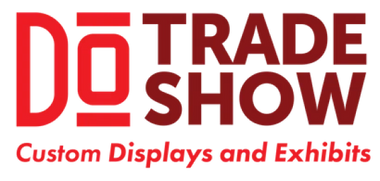Tabletop shows are a common first step for new or small business exhibitors. While they are not often produced on the same scale as larger trade shows, there is no reason why you can't create trade show displays that catch the attention of attendees and represent your company with a professional appeal. Here are a few display styles that are appropriate, useful, and versatile, too!
Tabletop Pop up Displays: A small show does not necessarily require that you have a small display. These tabletop pop-ups stand 59 inches tall and give you either six or eight feet of width for graphics. All of this while still leaving enough room on your table for literature, products, or most other things you are going to need on your table. This is the most effective and striking way to incorporate large-scale graphics with tabletop trade show displays. And while the fully set up size is impressive, it's even more impressive when you see how small it becomes for storage and transport.
Tabletop Panel Displays: Panel displays are an old stand-by for everything from school science fairs to company presentations. They are equally useful as trade show displays, on their own at a smaller show or as a part of a larger booth display setup. They are often dismissed to their smaller size and simplicity, but that can be a strength, too. A six-foot wide panel display actually gives you quite a bit of area to attach velcro graphics, and when they are professionally produced, you don't sacrifice any of your professional appearance. When the show is over, it all folds into a carrying bag and you are on your way! Another option is a panel display that accepts not only velcro graphics, but also has a whiteboard function for on-the-spot updates or demonstrations.
Tabletop Retractable Banner Displays: Retractable portable banner stands are typically used as a floor-standing display in addition to larger, backdrop-type trade show displays or as a point-of-sale display. Not everyone realizes that they can also be used as a tabletop display without changing anything at all. The key to making this work is two-fold. First is the fact that the banner stand is held up by a three-section pole in the back. This gives one the ability to use one, two, or all three sections to adjust the banner holder height. Second, the graphics must be designed in such a way that the pull up banner makes sense as a floor-standing unit, or at the shorter tabletop height.
